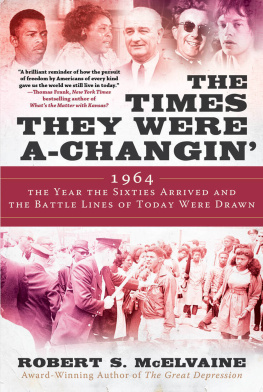Robert S McElvaine - The Times They Were a-Changin: 1964, the Year the Sixties Arrived and the Battle Lines of Today Were Drawn
Here you can read online Robert S McElvaine - The Times They Were a-Changin: 1964, the Year the Sixties Arrived and the Battle Lines of Today Were Drawn full text of the book (entire story) in english for free. Download pdf and epub, get meaning, cover and reviews about this ebook. year: 2022, publisher: Arcade, genre: Politics. Description of the work, (preface) as well as reviews are available. Best literature library LitArk.com created for fans of good reading and offers a wide selection of genres:
Romance novel
Science fiction
Adventure
Detective
Science
History
Home and family
Prose
Art
Politics
Computer
Non-fiction
Religion
Business
Children
Humor
Choose a favorite category and find really read worthwhile books. Enjoy immersion in the world of imagination, feel the emotions of the characters or learn something new for yourself, make an fascinating discovery.
- Book:The Times They Were a-Changin: 1964, the Year the Sixties Arrived and the Battle Lines of Today Were Drawn
- Author:
- Publisher:Arcade
- Genre:
- Year:2022
- Rating:5 / 5
- Favourites:Add to favourites
- Your mark:
The Times They Were a-Changin: 1964, the Year the Sixties Arrived and the Battle Lines of Today Were Drawn: summary, description and annotation
We offer to read an annotation, description, summary or preface (depends on what the author of the book "The Times They Were a-Changin: 1964, the Year the Sixties Arrived and the Battle Lines of Today Were Drawn" wrote himself). If you haven't found the necessary information about the book — write in the comments, we will try to find it.
If 1968 marked a turning point in a pivotal decade, 1964or rather, the long 1964, from JFKs assassination in November 1963 to mid-1965was the time when the sixties truly arrived. It was then that the United States began a radical shift toward a much more inclusive definition of American, with a greater degree of equality and a government actively involved in social and economic improvement.
It was a radical shift accompanied by a cultural revolution. The same month Bob Dylan released his iconic ballad The Times They Are a-Changin, January 1964, President Lyndon Johnson announced his War on Poverty. Spurred by the civil rights movement and a generation pushing for change, the Civil Rights Act, the Voting Rights Act, and the Immigration and Nationality Act were passed during this period. This was a time of competing definitions of freedom. Freedom from racism, freedom from poverty. White youth sought freedoms they associated with black culture, captured imperfectly in the phrase sex, drugs, and rock n roll. Along with freedom from racist oppression, black Americans sought the opportunities associated with the white middle class: white freedom. Women challenged rigid gender roles. And in response to these freedoms, the changing mores, and youth culture, the contrary impulse found political expression in such figures as Barry Goldwater and Ronald Reagan, proponents of what was presented as freedom from government interference. Meanwhile, a nonevent in the Tonkin Gulf would accelerate the nations plunge into the Vietnam tragedy.
In narrating 1964s moment of reckoning, when American identity began to be reimagined, McElvaine ties those past battles to their legacy today. Throughout, he captures the changing consciousness of the period through its vibrant music, film, literature, and personalities.
Robert S McElvaine: author's other books
Who wrote The Times They Were a-Changin: 1964, the Year the Sixties Arrived and the Battle Lines of Today Were Drawn? Find out the surname, the name of the author of the book and a list of all author's works by series.












